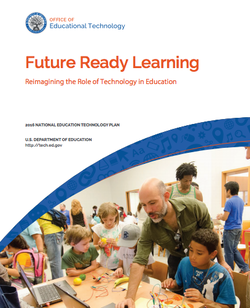
TEACHER EDUCATOR TECHNOLOGY COMPETENCIES
Teresa S. Foulger, Arizona State University, [email protected]
Kevin J. Graziano, Nevada State College, [email protected]
Denise A. Schmidt-Crawford, Iowa State University, [email protected]
David A. Slykhuis, University of Northern Colorado, [email protected]
The Teacher Educator Technology Competencies (TETCs) can be found at http://site.aace.org/tetc/
Foulger, T.S., Graziano, K.J., Schmidt-Crawford, D. & Slykhuis, D.A. (2017). Teacher Educator Technology Competencies. Journal of Technology and Teacher Education, 25(4), 413-448. Waynesville, NC USA: Society for Information Technology & Teacher Education. Retrieved from https://www.learntechlib.org/p/181966/.
Teresa S. Foulger, Arizona State University, [email protected]
Kevin J. Graziano, Nevada State College, [email protected]
Denise A. Schmidt-Crawford, Iowa State University, [email protected]
David A. Slykhuis, University of Northern Colorado, [email protected]
The Teacher Educator Technology Competencies (TETCs) can be found at http://site.aace.org/tetc/
Foulger, T.S., Graziano, K.J., Schmidt-Crawford, D. & Slykhuis, D.A. (2017). Teacher Educator Technology Competencies. Journal of Technology and Teacher Education, 25(4), 413-448. Waynesville, NC USA: Society for Information Technology & Teacher Education. Retrieved from https://www.learntechlib.org/p/181966/.

The TETCs authors were awarded the
2021 AACTE Edward C. Pomeroy award for
Outstanding Contributions to Teacher Preparation
2021 AACTE Edward C. Pomeroy award for
Outstanding Contributions to Teacher Preparation
In 2017, the U.S. Department of Education, National Education Technology Plan placed the responsibility of the technology preparation of teachers on colleges/school of education and in turn on teacher education faculty (U.S. Department of Education, Office of Educational Technology, 2017). The National Education Technology Plan explicitly called for those involved in teacher preparation to develop a common set of technology competencies and expectations for university and college professors who support teacher candidates. By establishing a set of clear and useful competencies that apply to all teacher educators, regardless of their content focus, it would help teacher educators teaching in colleges/schools of education move forward in the effort to develop teacher candidates’ ability to teach with technology. Charged with that calling, Foulger, Graziano, Schmidt-Crawford, & Slykhuis (2017) led a highly collaborative research study to develop the Teacher Educator Technology Competencies (TETCs). By applying the TETCs to all teacher educators, it will ensure that teacher candidates experience being taught effectively with technology throughout their entire teacher preparation program. If teacher candidates experience this type of teaching and modeling with technology, they will, in turn, be more likely to teach effectively with technology in their own classrooms.
The goal of the TETC research project was to develop competencies that would be visionary, as timeless as possible, and accepted among those in the variety of courses offered in teacher preparation programs. What ensued was a year-long, collaborative research process involving several teacher educators and educational technology experts from across the country and internationally (Foulger, Graziano, Schmidt-Crawford, & Slykhuis, 2017). The process began with a review of literature (crowdsourcing) and was followed by six iterations of revisions, informed by an 18-member Delphi panel. The final step involved open public comment. The end result to this highly collaborative, multimethod approach was the Teacher Educator Technology Competencies (TETCs) (see http://site.aace.org/tetc/) (Foulger et al., 2017).
The TETCs encourage teacher educators to design instruction that utilizes content-specific technologies to enhance teaching and learning; incorporate pedagogical approaches that prepare teacher candidates to effectively use technology; and support the development of the knowledge, skills, and attitudes of teacher candidates as related to teaching how technology is used by learners in their content area. The TETCs support teacher educators’ use of technology to enhance teaching and learning; differentiate instruction to meet diverse learning needs; assess learners; connect globally with a variety of regions and cultures; teach online and/or blended/hybrid learning environments; and address the legal, ethical, and socially-responsible use of technology in education. The TETCs encourage teacher educators to engage in ongoing professional development and networking activities to improve the integration of technology in their teaching, engage in leadership and advocacy for using technology, and apply basic troubleshooting skills to resolve technology issues (Foulger et al., 2017).
During the time when the TETCs were being developed, and in the short time since the TETCs were published, conversations within the educational technology community have been rich. Confirming the direction of this effort, national organizations, whose missions involve furthering the use of technology in education, openly supported the development of the TETCs and served in an advisory capacity. These organizations included: the U.S. Department of Education Office of Educational Technology, the Council for the Accreditation of Educator Programs (CAEP), the National Technology Leadership Coalition, the Society for Information Technology and Teacher Education (SITE), the Teacher Education Network of the International Society for Technology in Education (ISTE-TEN), and the American Association of Colleges for Teacher Education (AACTE).
STAY CONNECTED
TETCs listserv: https://preview.tinyurl.com/TETCslist
TETCs website: http://teacheredtechcompetencies.org/
Twitter: #TETCs
TETCs listserv: https://preview.tinyurl.com/TETCslist
TETCs website: http://teacheredtechcompetencies.org/
Twitter: #TETCs
Supporting Organizations:
Page last updated March 21, 2018.



